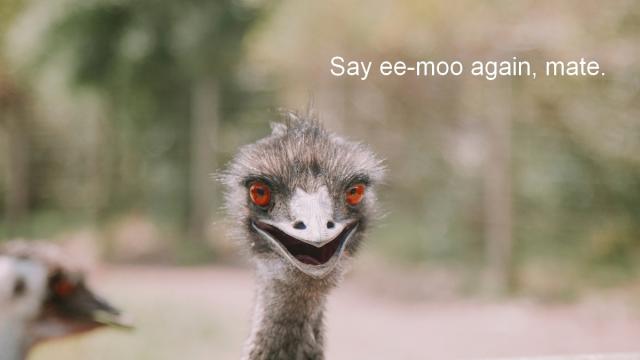The Great Emu War may have finished nearly 90 years ago but a new one is brewing online after an NPR employee declared the correct way to pronounce emu was ee-moo.
Stu Rushfield is National Public Radio’s (NPR) technical director of Weekend Edition but after a seemingly innocent tweet posted Monday, 24 August, he’s now also a “nemesis of Australia”.
BIG EMU NEWS! After discussions with editors &the NPR RAD team (Research, Archives & Data), the ruling is that ee-moo wins!! The OED’s pronunciation favors ee-mew, this is one of the common words for which NPR doesn’t have a standard pronunciation for, & ee-moo is acceptable. pic.twitter.com/0K0gdyuGqB
— Nemesis of Australia ???? (@stu_rush) August 21, 2020
Rushfield wrote on Twitter that the US radio station had finally landed a decision on how to pronounce “emu”. Defying all logic, they decided it could be pronounced as “ee-moo”.
“BIG EMU NEWS! After discussions with editors &the NPR RAD team (Research, Archives & Data), the ruling is that ee-moo wins!!” Rushfield wrote.
“The OED’s [Oxford English Dictionary] pronunciation favors ee-mew, this is one of the common words for which NPR doesn’t have a standard pronunciation for, & ee-moo is acceptable.”
The Australian response to the news was swift and decisive — it’s plain wrong and we shall not stand for it.
This is wrong. @fcc please pull @npr‘s license.
— Dan Ilic ???????? (@danilic) August 24, 2020
It comes after the Weekend Edition was tasked with reporting on an escaped emu, called Winston, who went missing for four days before finally being recouped.
What’s the real pronunciation of emu?
Language is a funny thing. There can be multiple ways to say a word but there are some that are almost universally agreed upon. Emu is likely one of those.
According to the Cambridge Dictionary, both the US and UK pronunciations are ee-mew.
Both the Merriam-Webster and MacMillan dictionary back this up.
It’s unclear how or why NPR determined that the animal, which features on Australia’s own coat of arms, sounds like an internet cow.
At the end of the day, you’re more than welcome to insist on ee-moo but dictionaries and the population of Australia will not be on your side. It’s a bold choice to live and die by but we respect it.

Leave a Reply
You must be logged in to post a comment.